FRESH, September 6, 2022: Demand Surges As Detroit Unrolls Water Affordability Plan
September 6, 2022
Fresh is a biweekly newsletter from Circle of Blue that unpacks the biggest international, state, and local policy news stories facing the Great Lakes region today. Sign up for Fresh: A Great Lakes Policy Briefing, straight to your inbox, every other Tuesday.
— Laura Gersony, Fresh Editor
This Week’s Watersheds
- A new water affordability plan takes effect in Detroit.
- A Michigan Air Force base opts to use state standards instead of stricter federal drinking water guidelines when cleaning up PFAS.
- Several Great Lakes states receive federal dollars to clean up abandoned oil and gas wells.
- Officials call for federal intervention to investigate last month’s spill of a cancer-causing chemical into Michigan’s Huron River.
- Canada invokes a treaty to prevent the shutdown of the Line 5 pipeline in Wisconsin.
The NAACP and an environmental group are fighting a highway project in Erie, Pennsylvania.
“Any contract awarded by PennDOT will set in motion a governmental process that will be difficult to stop — what courts call the ‘bureaucratic steamroller.’”
— Motion for preliminary injunction: Erie Branch of NAACP and Citizens for Pennsylvania’s Future
Two citizen groups are asking a judge to block construction of a Pennsylvania highway project until their lawsuit is resolved, Go Erie reports. The Erie branch of the NAACP and the environmental group Citizens for Pennsylvania’s Future allege that the project’s truncated environmental review was not sufficient, and did not allow for public input. The plaintiffs also argue that the company has not adequately assessed how the project could impact nearby neighborhoods, many of which are impoverished and communities of color. The defendants, Pennsylvania’s Department of Transportation and the Federal Highway Administration, argue that they followed federal law by conducting a truncated environmental review, and that PDOT has held public meetings throughout the permitting process.
Fresh from the Great Lakes News Collaborative
- Canada Invokes Pipeline Treaty a Second Time to Protect Enbridge’s Line 5 — Michigan Radio
- Under Current Climate Trends, Michigan’s Up North Forests Could Be Doomed — Bridge Michigan
- Poisonous Ponds: Tackling Toxic Coal Ash — A 12-part series from Great Lakes Now and Energy News Network
The Great Lakes News Collaborative includes Bridge Michigan; Circle of Blue; Great Lakes Now at Detroit Public Television; and Michigan Radio, Michigan’s NPR News Leader. We work together to produce news and information about the impact of climate change, pollution, and aging infrastructure on the Great Lakes and drinking water. This independent journalism is supported by the Charles Stewart Mott Foundation. Find all the work here.
Demand Surges as Detroit Unrolls Water Affordability Plan
Starting this month, over 2,500 Detroit residents will see lower water rates as a new affordability plan takes effect, the Detroit Free Press reports. The plan offers low-income residents a fixed monthly water rate, calculated based on a resident’s income and water usage. Four thousand more households are on the program’s waiting list. This month also sees a new rate structure in Detroit, which lowered most water bills by $2. The city’s moratorium on water shutoffs, enacted more than two years ago, is set to expire at the end of 2022, though officials say that households enrolled in the affordability program will not be affected.
- Why it matters: Throughout the Great Lakes region and across the U.S., water systems are aging. In some communities, this means water bills that residents can’t afford or water that’s unsafe to drink. The Great Lakes News Collaborative investigated the true cost of water in Michigan with a special series of reports and events during May.
In the News
PFAS: The Air Force will not use the EPA’s stringent new drinking water guidelines when cleaning up PFAS at a shuttered Michigan base, MLive reports. The Air Force will instead abide by Michigan’s more lenient groundwater rules. The site manager of the Wurtsmith Air Force Base in Oscoda, Michigan, announced the decision in a public hearing, arguing that the new EPA drinking water guidelines for two PFAS chemicals are interim and advisory. The admission marks a pivot from the Air Force’s years of resistance to the state’s PFAS rules, when officials said they would await federal guidance. Critics contend that the Air Force chooses its cleanup response based on whatever standards are most convenient. High levels of PFAS have been detected around military bases across the country, mostly from firefighting foam used in training exercises.
OIL AND GAS CLEANUP: Several Great Lakes states have received federal funding to begin cleaning up abandoned oil and gas wells, the Department of Interior announced last week. New York, Illinois, Ohio, Michigan, and Pennsylvania all secured money to clean up hundreds of wells each. The funding is part of a nearly $5 billion program, enacted as part of the 2021 Bipartisan Infrastructure Law, to locate abandoned wells, plug them, and track their emissions of methane, a powerful planet-warming gas.
Looking Ahead
ACCOUNTABILITY: After last month’s spill of a cancer-causing compound into Michigan’s Huron River, some lawmakers are pushing for federal intervention, writes E&E News. Michigan’s energy and environment department is currently investigating Tribar Technologies, Inc. for its spill of hexavalent chromium, a carcinogenic substance used to shine automobile equipment during production, into a wastewater treatment facility on the Huron River. The spill was mostly contained, with only 20 gallons making it downstream into the river. But a number of officials — including Rep. Debbie Dingell, the head of Michigan’s environment agency, and the EPA regional administrator — are calling for the greater investigative and enforcement power of the federal government.
PIPELINES: With legal challenges brewing in U.S. courts, Canada has invoked a binational treaty to prevent the shutdown of the Line 5 oil pipeline, Reuters reports. The 1977 treaty assures the free flow of oil between the U.S. and Canada. The Bad River Band is challenging the pipeline, which runs along the Canadian border with Wisconsin, for the risk of a leak on tribal lands. The tribe also argues that Enbridge, which operates the pipeline, has violated the conditions of their agreement to occupy the tribe’s land. Canadian officials have previously argued that shutting down the pipeline would further disrupt world energy markets.
Upcoming Events
- September 15-16, 2022: Fall 2022 Smart Ships Coalition Workshop — register
- September 21, 2022: Demystifying hazardous material spill preparedness — register
- September 27-29, 2022: Great Lakes Public Forum — register
- October 11-13, 2022: Great Lakes Commission Annual Meeting – register
Other News
- A new water plant helped Flint dodge a shutoff that affected much of southeast Michigan.
- Minnesota regulators decide that utilities may not unload the full costs of a February 2021 storm onto consumers.
- Local leaders in Illinois await guidance from the EPA on PFAS cleanup.
- Friday night fish frys, a staple in Wisconsin, adapt to climate change.
Laura Gersony covers water policy, infrastructure, and energy for Circle of Blue. She also writes FRESH, Circle of Blue’s biweekly digest of Great Lakes policy news, and HotSpots H2O, a monthly column about the regions and populations most at-risk for water-related hazards and conflict. She is an Environmental Studies and Political Science major at the University of Chicago and an avid Lake Michigan swimmer.

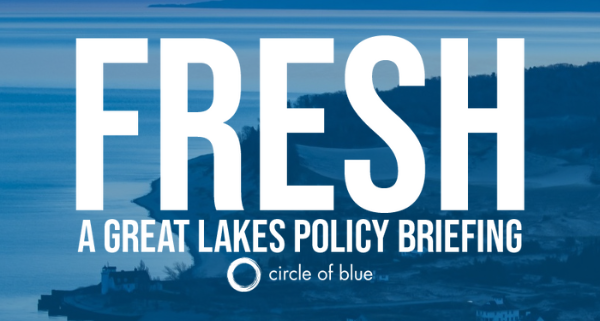
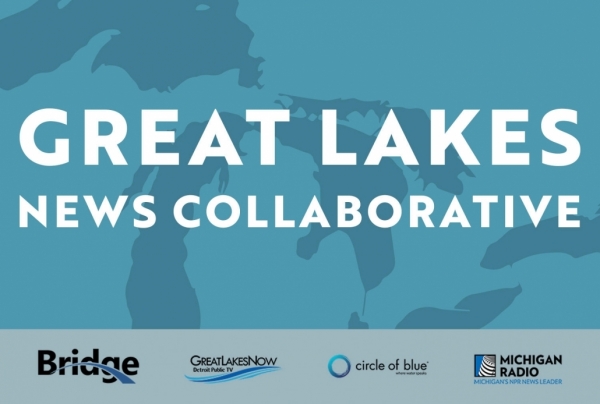


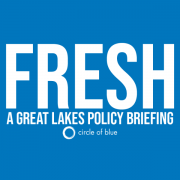
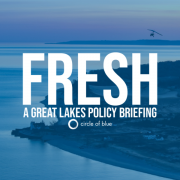



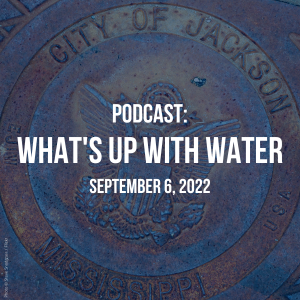
Leave a Reply
Want to join the discussion?Feel free to contribute!